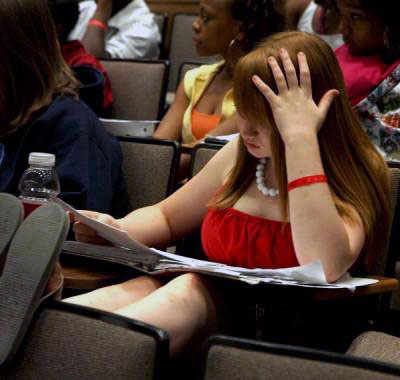All Nonfiction
- Bullying
- Books
- Academic
- Author Interviews
- Celebrity interviews
- College Articles
- College Essays
- Educator of the Year
- Heroes
- Interviews
- Memoir
- Personal Experience
- Sports
- Travel & Culture
All Opinions
- Bullying
- Current Events / Politics
- Discrimination
- Drugs / Alcohol / Smoking
- Entertainment / Celebrities
- Environment
- Love / Relationships
- Movies / Music / TV
- Pop Culture / Trends
- School / College
- Social Issues / Civics
- Spirituality / Religion
- Sports / Hobbies
All Hot Topics
- Bullying
- Community Service
- Environment
- Health
- Letters to the Editor
- Pride & Prejudice
- What Matters
- Back
Summer Guide
- Program Links
- Program Reviews
- Back
College Guide
- College Links
- College Reviews
- College Essays
- College Articles
- Back
Increase Sleep and Increase of Achievement
Everyday I get up at six forty-five to get ready for school. I leave my house at seven thirty and I make it to school around seven fifty. Rewind to the night before when I layed down at nine but didn’t fall asleep until one A.M. Do you teenagers lay down early but still not fall asleep until much latter in the night? Do you notice that your kids fall asleep late then wake up groggy and moody?
When I come into school I hear a lot of “I’m so tired”, “ I didn’t get enough sleep.”, or “ I only got five hours of sleep last night”. I even heard a large number of students say that they and their friends fall asleep in class. They try to hide the fact that they are asleep. Do any of you wonder why kids have such a hard time falling asleep at night?
Teenager need nine hours of sleep a night. Unfortunately their internal clocks changed and when this happens it tells them to sleep later and wake later in the morning. (Research shows that teens need about 9 hours of sleep a night. So, a teen who needs to wake up for school at 6 a.m. would have to go to bed at 9 p.m. to reach the 9-hour mark. Studies have found that many teens have trouble falling asleep that early, though. It's not because they don't want to sleep. It's because their brains naturally work on later schedules and aren't ready for bed.) says kidshealth. Its narutal for teenages to stay up later than they did when they were younger.
If teenager don’t get enough sleep they turn into a nasty ball of negativity. When teenagers don’t get sleep it can have a negative effect. Their mood are terrible and they don’t want to do their work. Teenagers not getting sleep can lead to being depressed and even heart problems. If teenagers had enough sleep image how their grade might go up or how much better their attitudes would be.
I went around my school and asked my teachers a few questions. The answers I got were all very interesting. These are the questions:
1. In what ways do you think starting school at eight thirty or nine would benefit students.
2. How do you feel this change in time would affect schedules.
3. What do you think feel contributes to students poor moods and grades.
I then asked if they were for or against this change in time. These are the answers:
Teacher 1 - This teacher say that she thinks starting at these times would benefit students. Her answer to the next question was she felt it would prolong the day. Her answer to the third question was stress, work overload, outside, and poor habits may be the reason for poor grade and attitudes.
Teacher 2 - This teacher's answer to the first question was she didn’t think it would make any difference. She said starting even later would be better. To the second question she said that it may have a negative effect on parents getting to work. For the third question she said a lack of sleep and the fact that a teenagers biology is changing and adapting. She was unsure if she is for or against it because she's not sure if it would be good or bad.
Teacher 3 - This teacher said that he didn’t think this particular change in time would have any benefits. His response to the second question was it would either make our days longer or it would make the week itself longer. His response to the third question was lack of sleep, being a teenager/peers, and issues at home. He is against this because it would make the day longer.
Teacher 4 - This teacher thinks that doing this would reduce stress and give more rest. She said we would have to shorten class time or use a blocked schedule. This teacher wants to know if the students feel welcome and if that affects them poorly or makes them happy. She was for staring later including if we used a blocked schedule.
I am for starting school later in the day, what about you? Not having enough sleep has a very negative effect on teenagers making them moody, and can contribute to poor grades. I asked some of my teachers what they though and the answers varied between positive and negative.

Similar Articles
JOIN THE DISCUSSION
This article has 0 comments.
